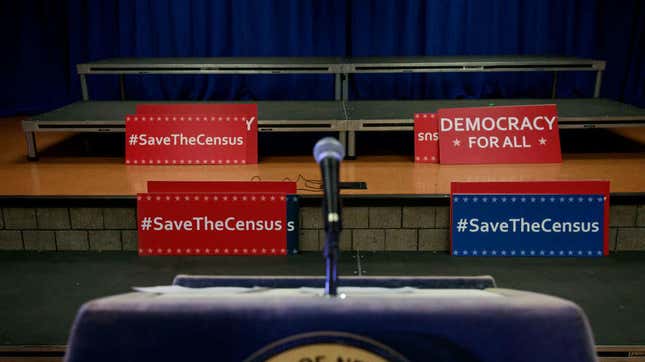
A federal judge in Maryland on Wednesday ruled there is enough new evidence to suggest the need to reconsider whether the Trump administration conspired to disenfranchise minorities and Democrats when it moved to add a citizenship question to the 2020 census.
U.S. District Court Judge George Hazel had already ruled against the citizenship question earlier this year, and his ruling is now being reviewed in federal appeals court. But with his latest finding, plaintiffs can seek to have the matter returned to his lower court for renewed consideration, the Washington Post reports.
The U.S. Supreme Court is currently considering similar rulings made against the citizenship question by judges in New York and California. The nation’s highest court is expected to issue its finding in the coming days.
However, plaintiffs suing to stop the Trump administration called Hazel’s decision monumental as it could give the Supreme Court new evidence to consider if the case again ends up before the justices next term, the Post reports:
“This is a significant move by the district court that gives credence to what we all know, that the government conspired to discriminate against Latinos and immigrants of color when it added a citizenship question to the 2020 census,” said Andrea Senteno, regional counsel for the Mexican American Legal Defense and Educational Fund (MALDEF), a plaintiff in the case.
As CNN reports, plaintiffs in the three cases charge that the addition of a citizenship question to the census will disenfranchise immigrant and minority residents. Census findings help determine, among other things, how federal dollars are distributed.
While Hazel, along with two other federal trial judges, had already ruled against the citizenship question, he and the other two did so on procedural issues, not on the issue of discrimination. Hazel’s latest decision puts the discrimination issue at play.
As the Washington Post explains:
Hazel had ruled in April against the question, joining two other federal judges in finding that the government had violated administrative law when it added it last year. But in that decision he did not find enough evidence to support plaintiffs’ claims that the government intended to discriminate against immigrants, Latinos and Asian Americans by adding the question, or that adding it was part of a conspiracy within the Trump administration to violate the constitutional rights of non-citizens and people of color.
At issue is evidence that came out after the death of Republican operative Thomas Hofeller. Computer files released by his daughter showed that Hofeller had done a 2015 study in which he found that adding a citizenship question to the census would advantage “Republicans and non-Hispanic whites,” according to attorneys for the American Civil Liberties Union, one of the plaintiffs in the Maryland case, according to CNN.
Hofeller shared his findings with Donald Trump’s team in the years leading up to Trump announcing his candidacy for president and then winning election, according to the ACLU, which charges that Hofeller’s findings were the real motive behind the Trump team’s desire to add the citizenship question.
The Trump administration denies the allegation, arguing before Hazel that the change was desired to help better enforce federal election law.
“There’s no evidence that [a 2015 study by Hofeller on the effects of adding a citizenship question] was ever shared with anyone inside or outside the federal government,” said Department of Justice attorney Josh Gardner, according to the Post.
In the Supreme Court, the tenor of questions asked by the justices during arguments this spring has many court-watchers expecting the justices to rule in favor of the administration.
But Hazel’s decision could put the case back in play no matter the outcome, CNN reports.

